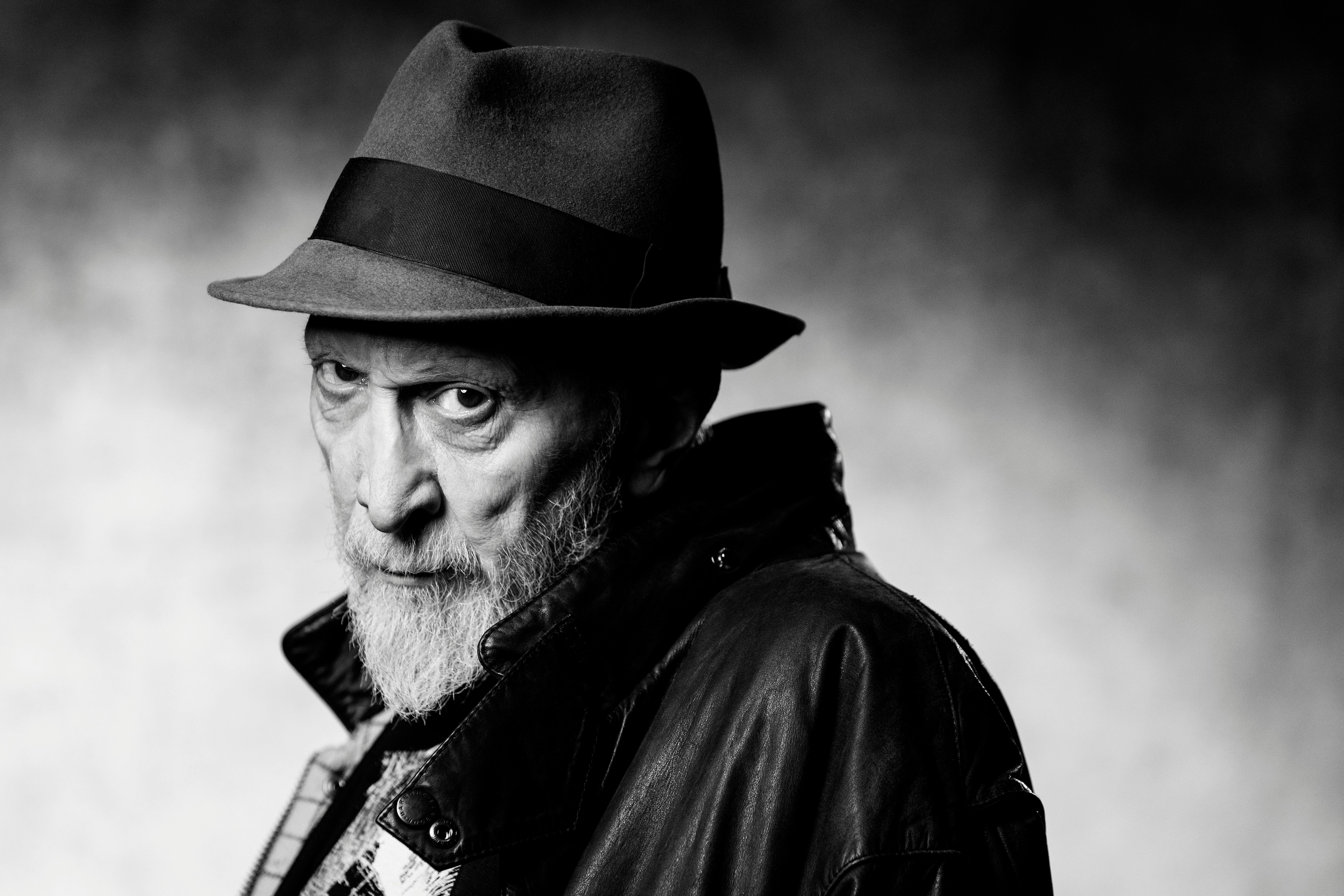
In 2006, two trailblazing artists joined forces to bring one of the most inventive comics ever made to the silver screen. The result was 300, which transformed Frank Miller’s epic retelling of the Battle of Thermopylae into a cinematic spectacle and cemented its director, Zack Snyder, as a force to be reckoned with. Now, almost two decades later, Snyder and Miller reunite for a wide-ranging conversation about the nature of superheroes, comics, and art itself as part of Inverse’s 2024 Superhero Issue, guest edited by Zack Snyder. This interview has been edited for brevity and clarity.
Zack Snyder: Look, here's the thing, I was approached by Inverse to curate an issue of their online magazine, and they were like, “What do you want to talk about in comic books?” The first thing I said is, “I want to talk about sex.” And they were like, “Jesus, OK, well…” And then I said, “OK, but you know what I'm saying?” If I said to my father like, “Oh, I want to work in comic books,” he'd be like, “Oh, that's cute. You're going to work with the children.” But my perception of comic books is that — and it's partly your fault, Frank — I perceive comic books as one of the most complete storytelling formats where the artist, with words and pictures, can describe the human condition in the most complicated and beautiful way. And so I told them, “Look, I really want to explore the perception of comic books as an adult medium with adult themes, real struggles, and psychologically complex characters that are fully formed in their morality, or lack thereof, and really hold up a mirror to us as a society.”
So anyway, they were like, “OK, that all sounds cool. How are you going to do that?” And I said, “Well, we'll write a series of articles and maybe I'll interview Frank Miller, because I feel like Frank is the Rosetta Stone for this evolution that I underwent in my life where I found in his work, well first of all, like a kindred spirit, but also he told a truth that I believed about myth and complex characters and deconstructed the hero in a way that really I could really relate to.”
So, that was sort of my thesis in this discussion. Does that make sense?
Frank Miller: Yeah, it does.
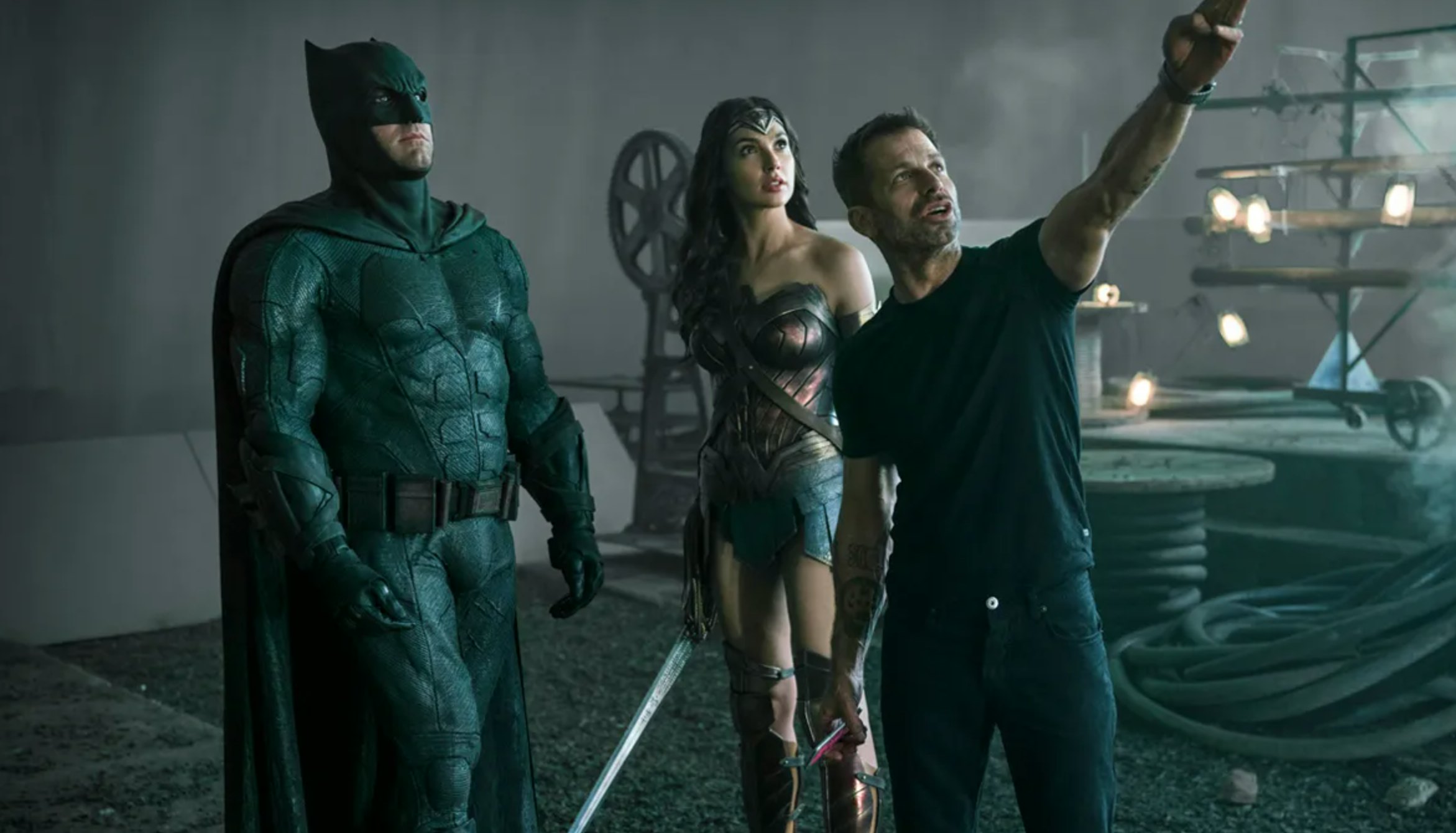
Zack Snyder: OK, so I'm going to start. Over the course of your career, you've redefined what a comic book can be. What initially drew you to explore darker, more adult themes in your storytelling and in a comic book medium as a way of expressing that?
Frank Miller: I am, like any artist, someone who tests boundaries and I wanted to do comics that were growing with me or, at least, with its audience. Working on Daredevil was my opportunity as my first regular gig at Marvel. I continued having more freedom with the success of the series to explore new narrative possibilities and techniques. It wasn't until later I had a chance to do whatever I wanted and started doing things like political parody dressed up as science fiction with Martha Washington. And then to explore my deepest love of film noir and crime fiction in Sin City.
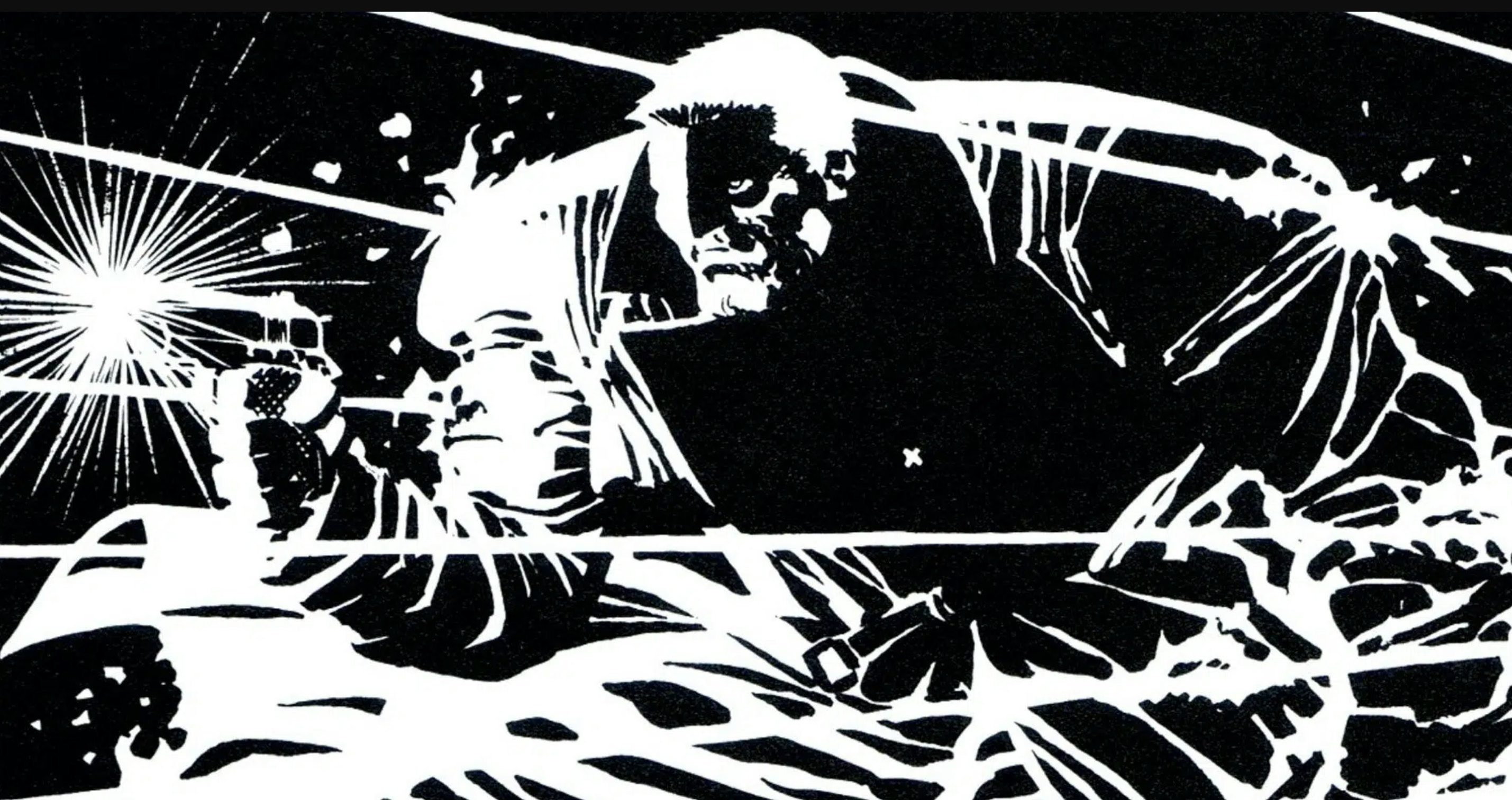
Zack Snyder: Right. In some ways, don't you think Sin City is the noir we never saw? They would always cut away in a noir movie. You kept showing us actually what they didn't.
Frank Miller: Well, what they couldn't.
Zack Snyder: Yeah, exactly.
Frank Miller: Imagine... What was that Mitchum movie where he played the psycho priest? The Night of the Hunter. Kind of Night of the Hunter done in the era of Silence of the Lambs.
Zack Snyder: Exactly. That's so cool. And that's kind of what Sin City is really.
Frank Miller: Yeah, that's what I was after. And really it was an unrestrained jump to the literary source of crime comics and the kind of wild, reckless violence of Mickey Spillane.
Zack Snyder: Awesome. Now, do you feel like when you did Ronin, were you just starting to push the boundaries? Like you said, Daredevil was kind of getting to do the work you wanted to do, but then I feel like with Ronin there's this kind of like, “Here's what’s going on inside my head,” kind of a vibe.
Frank Miller: Oh, absolutely, but I'll tell you, Zack, it was another thing, which is, it was me going crazy over having discovered within a very short period of time both The Lone Wolf and Cub series by Kojima Goseki and the work of Moebius and others. I was a young cartoonist and a pig in shit at the same time. I was just bathing in all these influences and I threw them all into Ronin.
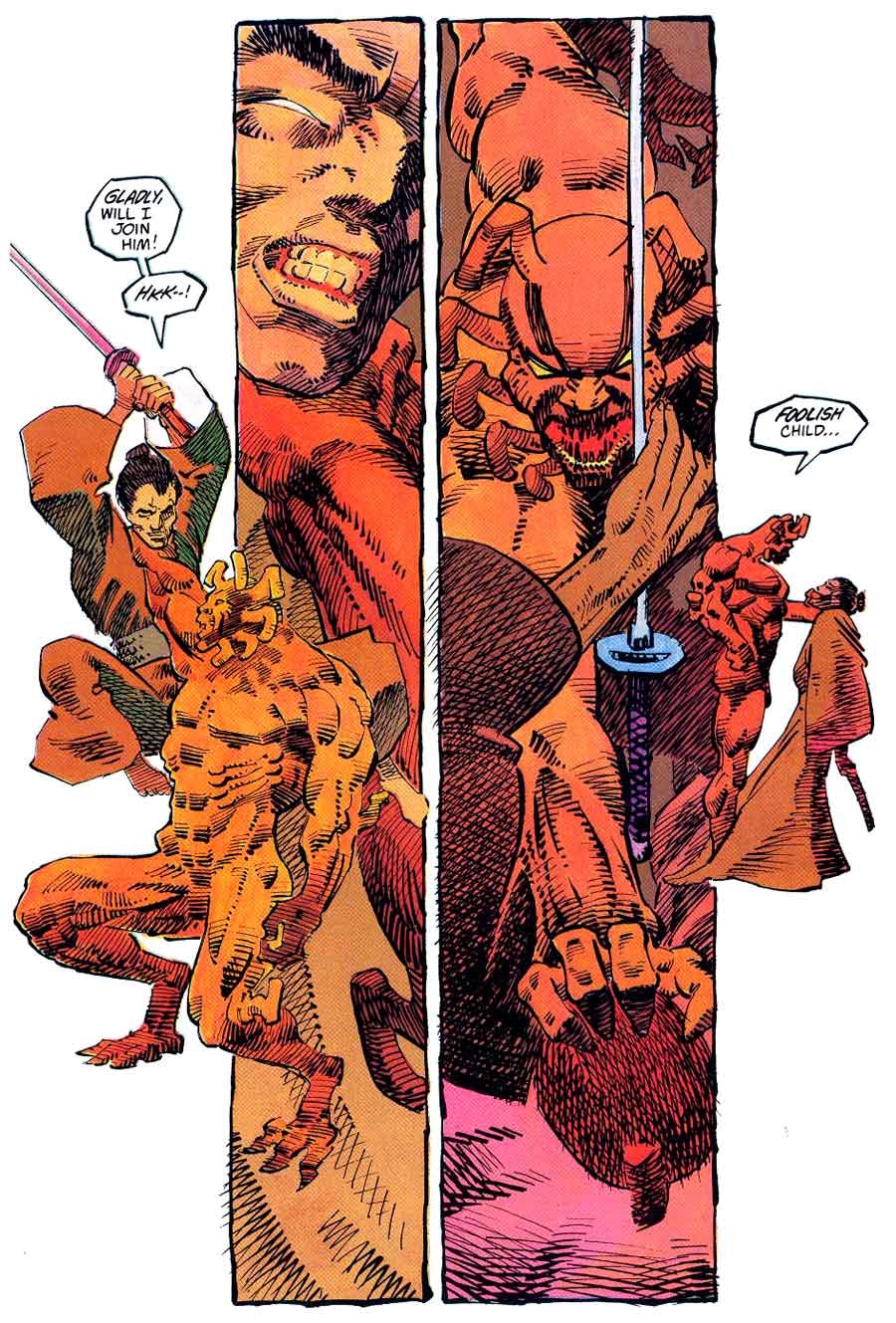
Zack Snyder: Mythology, both ancient and modern, plays a significant role in your work. How do you see classic archetypes? Have they influenced your characters in the worlds you've created at all?
Frank Miller: Well, we're definitely kindred spirits here, Zack, because I grew up on that stuff and it's at the absolute hardcore of the superhero comics that I grew up on and was first trained to do. If you look at the slogan for Shazam, it's basically just a list of mythic heroes and gods. It's Solomon. It's Hercules. That's the S and the H. And it's Atlas, Zeus — and I don't remember what the last two are.
And Superman has the origin of Moses, which kind of makes sense since he was created by a couple of Jewish kids in Ohio. And never mind Wonder Woman. She's just got Greek mythology all over her.
Zack Snyder: Yeah, legit.
Frank Miller: So how do I put it? If comics are kind of like the bastard child of other media, they're also the same to mythology.
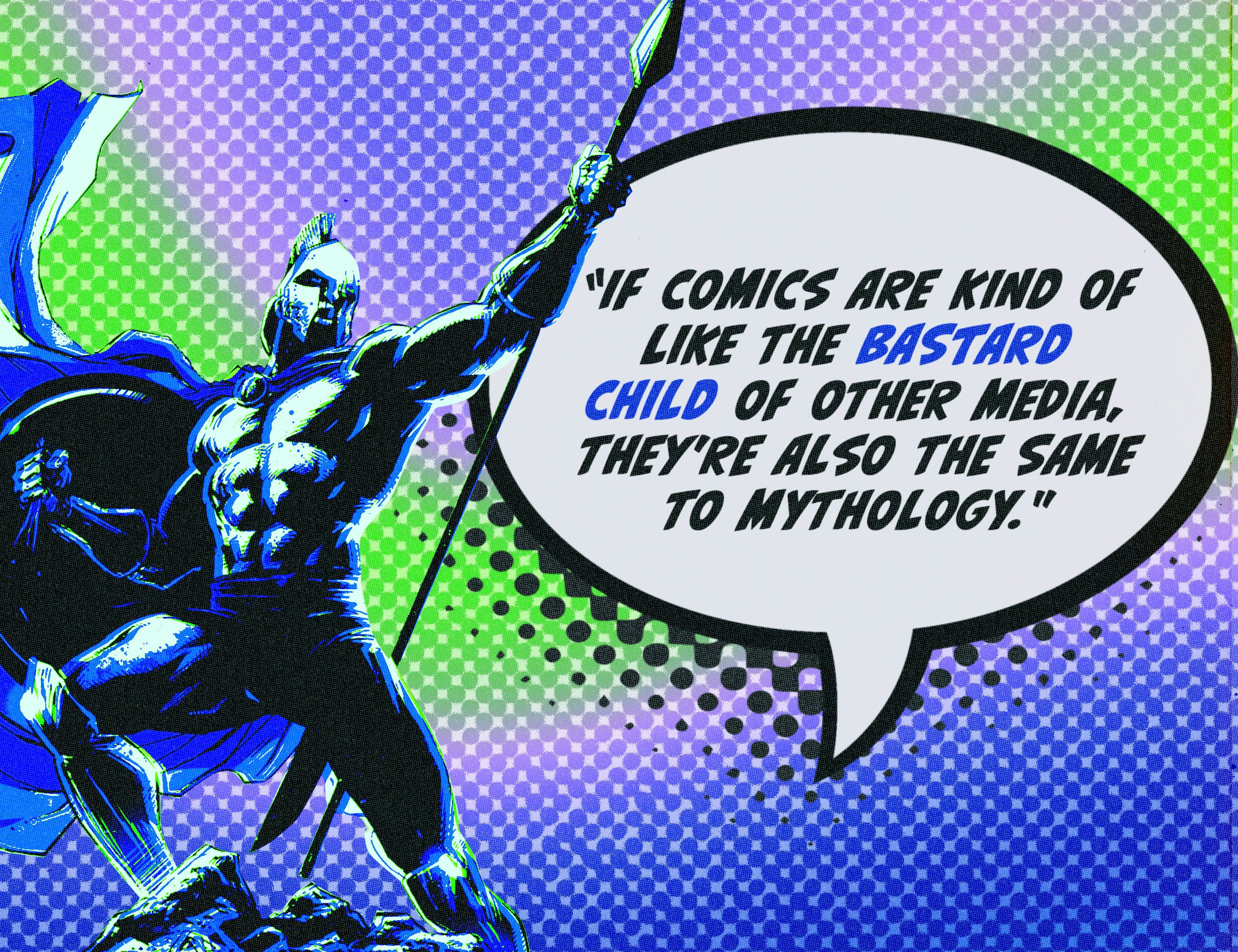
Zack Snyder: I have this theory that in the modern world, we lost myth, and so we use comics and superheroes to kind of decode the problems of our times. That is to say, in the ancient world, if a volcano went off, you'd be like, “Oh, there's a god in that mountain and he's mad.” Now, if a terrorist flies a plane into the World Trade Center, it's harder to make a myth out of it, but comics might allow that sort of thinking. I don't know how you feel about that.
Frank Miller: Well, I believe the birth of religion and mythology was basically a cave dweller not understanding lightning and having to anthropomorphize nature. Religion was the precursor to science.
Along the way where all these gods and heroes were created. The Greeks just couldn't stop puking them out. They had a legion of superheroes going on their own, and those really stayed in people's heads. And the superhero universes essentially are this wild amalgam of sort of recreated Greek, Nordic, and Hebrew mythologies.
Zack Snyder: Yeah, they've really endured. And so, is your feeling that to talk about mythology in comics is really kind of 101, because we're all still living in the shadow of those gods? So maybe that's what it is, if you deconstruct, you kind of peel away, and by peeling away you really get to the mythological part of it.
Frank Miller: That's the best way to put it. I've always found “deconstruct” to be a problematic term because people usually assume that when you deconstruct something, you're tearing it to pieces, and that's only half of what deconstruction really is because it's tearing its essence and then rebuilding it stronger than ever before. I mean, I wrote Batman cynically, in order to mock the character. I basically was just looking to get rid of all the shit and restore him to the kind of stature he had in my mind when I was seven years old.
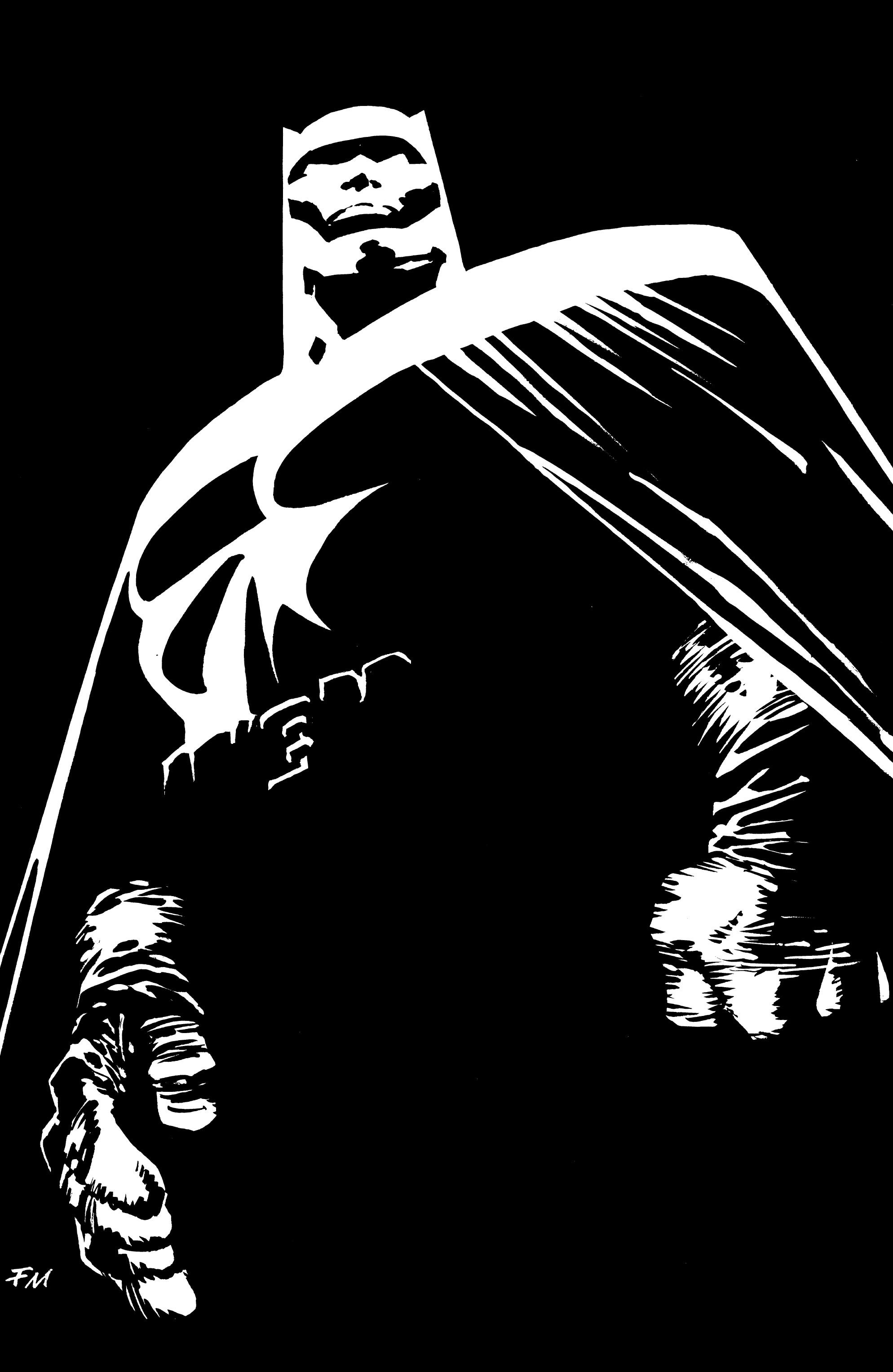
Zack Snyder: The Dark Knight Returns is often credited with revolutionizing how Batman is perceived. But also my takeaway from Dark Knight Returns is exactly the same as you just stated it. Some people would say it's deconstruction, and I understand that you might say that, but for me it was restorative. I'm like: That's my Batman. The Batman I want to see is that Batman, not the bullshit Batman who's a joke. What were your key influences when creating a darker, older, more psychologically complex Batman?
Frank Miller: The notorious old TV show, the one with Adam West and Burt Ward. I mean, that was a goof. It was basically a snide take on stuff that I remember that I absolutely loved. I loved the comic book characters and the TV show was constantly telling you how stupid the comic book was.
Zack Snyder: Yeah. Because it was counterculture against authority and they sort of saw Batman as the man. And so I just felt like they were making the man out to be sort of an idiot.
Frank Miller: Yeah. So, without question, I was rejecting that damn show more than anything when I did Dark Knight Returns.
Zack Snyder: You were like, literally, this is the opposite. This guy is the opposite of what you think he is.
Frank Miller: Yeah, this guy is no joke.
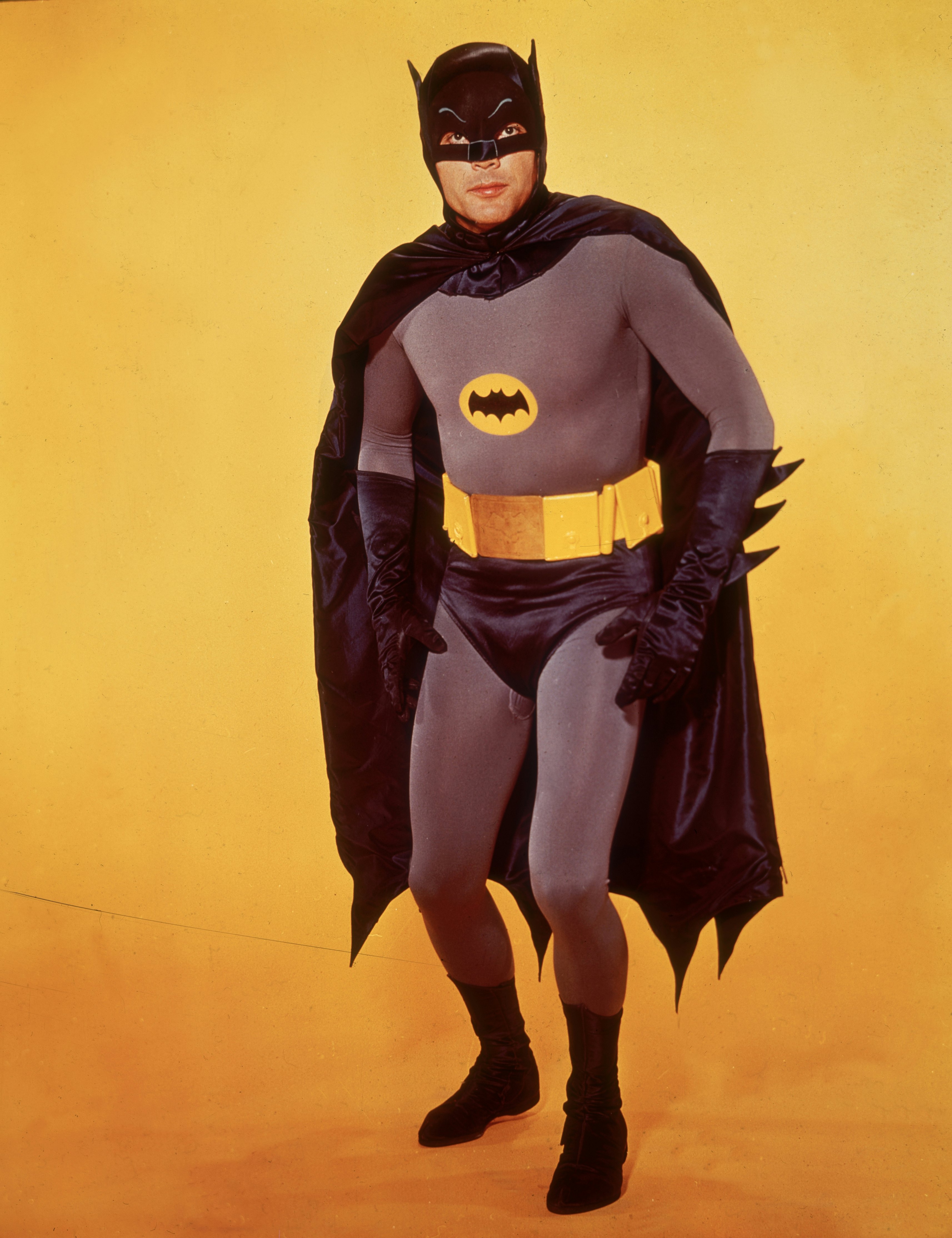
Zack Snyder: One of the things you do in Dark Knight Returns with the voiceover, in the sort of very specific language that he uses in combat and how he analyzes the combat that he's in, you go like, “OK, this guy is 100% more complicated in his combat style even, than you you can imagine.”
Frank Miller: I look at Batman as the self-made superhero. Bruce Wayne made himself Batman by studying, training, and exploring. Extraordinary feats come easily to Superman. He can fly and then the rest. I mean, just in terms of Superman, it's like you think you can do it. He can fly for god's sake. Whereas Batman needs a goddamn car. I enjoy an effort.
Zack Snyder: The one thing I really loved about the way you did Superman also was, he's sort of a tool of the U.S. government, but the Superman also in your version is self-aware. He knows what he's doing. Because everyone's like, “Oh, he's like a big boy scout.” Well, it's like, no, he understands the political complexity of the whole thing, and he's just done the math and goes, “Look, this is the only way we are able to exist is if we do it this way.”
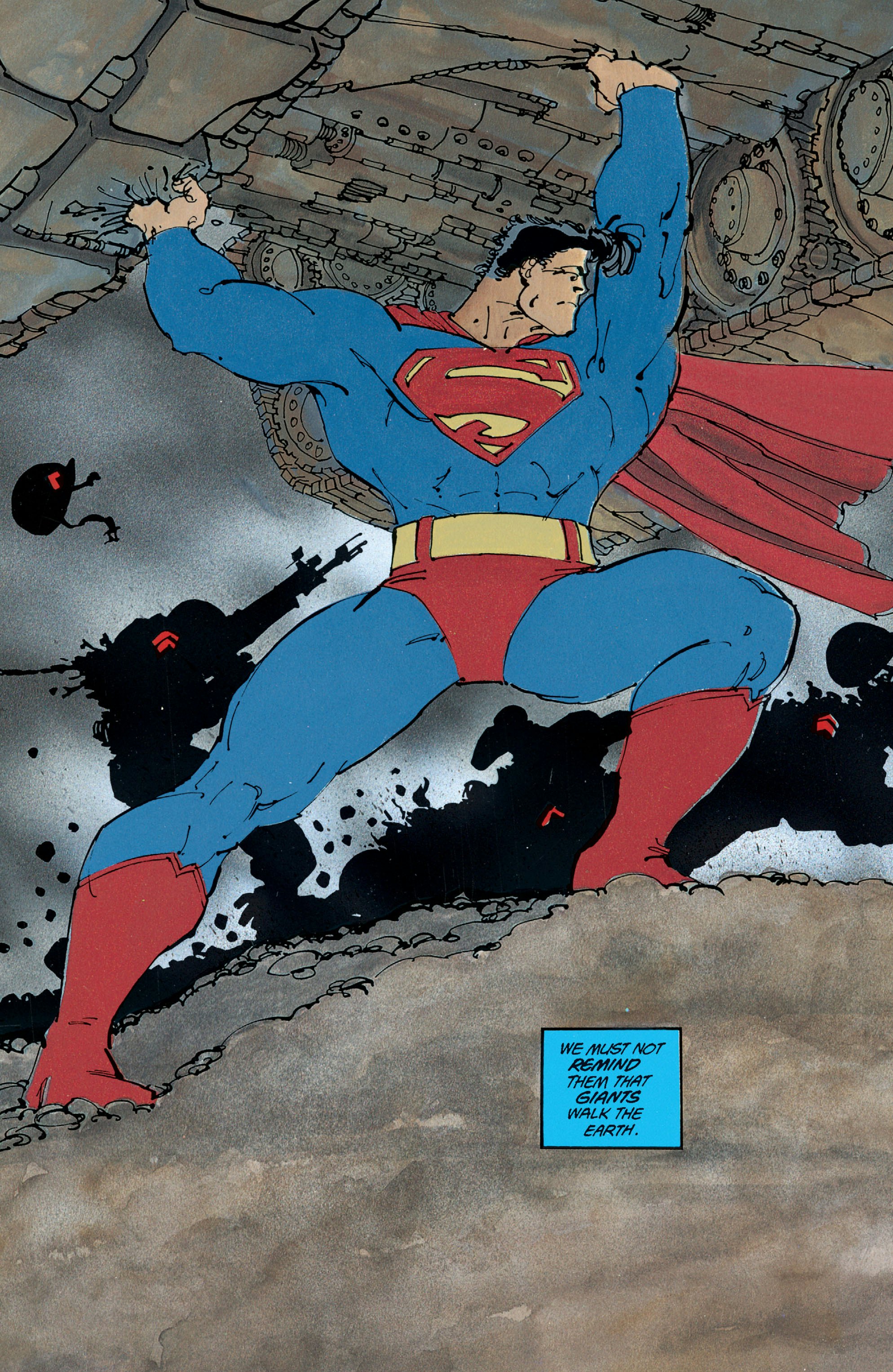
Frank Miller: Superman is an apologia worrywart and he’s concerned with keeping the world from blowing itself up. Batman's this Dionysian character who's out for blood, and they're perfect opposites in that Batman is the reckless ego and Superman is the fearful superego.
Zack Snyder: That's cool. I really love it, because I love that Superman is in charge of keeping this... In a lot of ways, the children are tearing the preschool down, they're setting it on fire, and they're out of their minds, and he’s really just trying to wrangle us so we don't kill ourselves and Batman’s just like, “No, that's what it is to be alive,” you know? That's cool.
Frank Miller: Batman is the happier character.
Zack Snyder: 100%. Yeah! 100%.
Frank Miller: I wanted to abolish the pouty Batman.
Zack Snyder: That's cool. Look, you know how I feel about the work. It’s incredible. So, the heroes in your stories are often morally ambiguous or even sometimes antiheroes. How do you view the evolution of the hero in modern storytelling, and why do you gravitate toward these more complex heroes?
Frank Miller: I regard defining the hero as being the center and purpose of my work, and in order to find something you have to test it, prod it, attend it, and find new ways to portray it. And I find sometimes having a hero do wrong or take a wrong course is the best way to ultimately define what a hero is, especially with my Daredevil and my portrait of Superman. It's again the deconstruction thing where you can get to a character's essence by having them wander far astray. With Daredevil: Born Again, he essentially has a nervous breakdown. He loses control of his violence and his darker tendencies and essentially has to lose everything before he can turn into a better character.
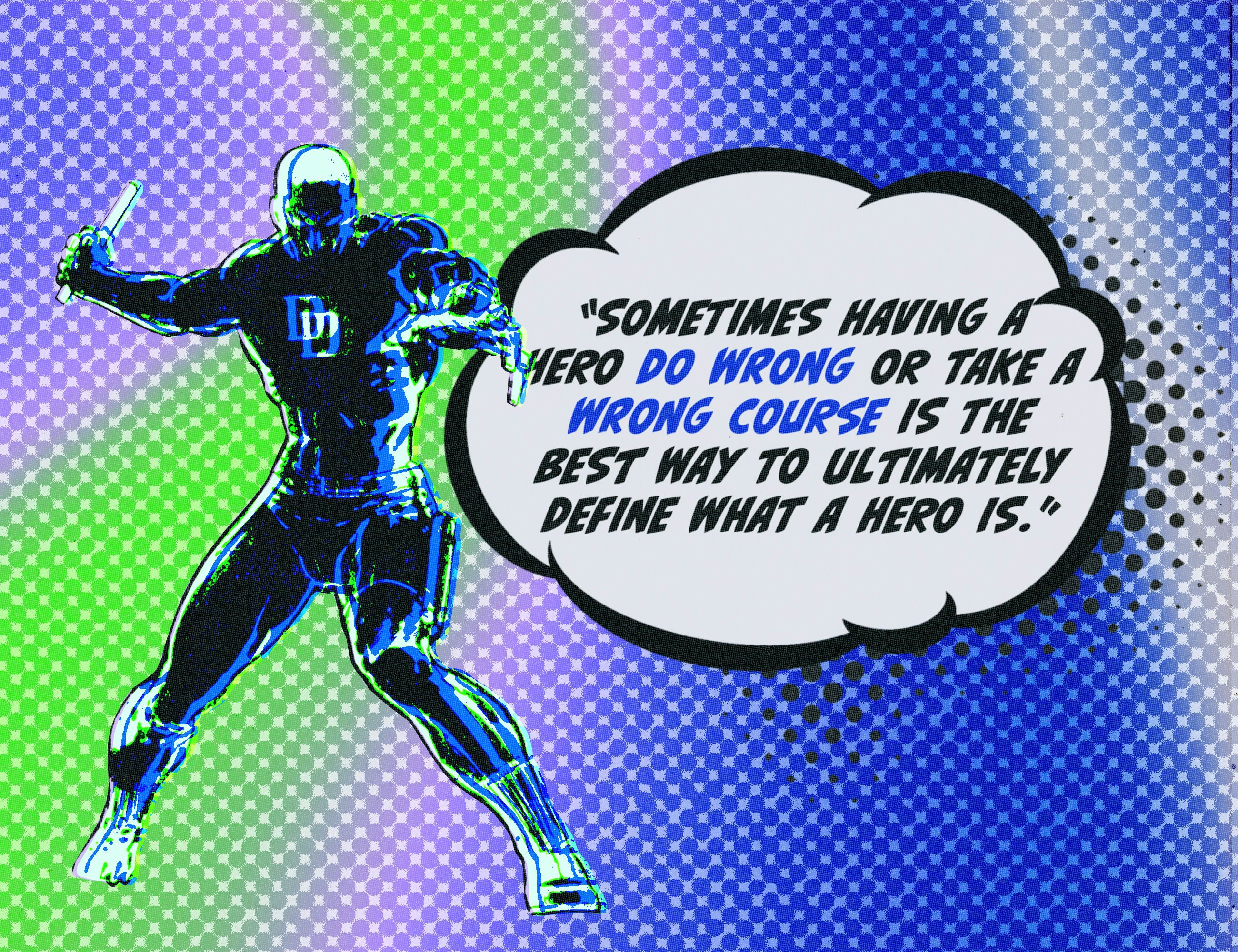
Zack Snyder: Yeah, that's cool. For me, if someone says in a hero's canon, he's not allowed to do blank, I immediately want him to do that thing because I feel like if a character can't withstand breaking his own canon, then he's not really worth anything, you know?
Frank Miller: Right. And then what defines him? I mean, at first, Zack, I approached this kind of thing almost like just a rebellious adolescent. I was told Batman could never fire a gun. I was told by the editor with absolute conviction. So, I came up with an excuse for him to fire a rifle, even though it was just a grappling hook into the side of a building, but it was just to get that picture of him holding it. I don't like these absolute dicta.
Zack Snyder: Well, it's cool because if you can create a scenario where Batman has to shoot a gun and someone says, “Well, Batman can't shoot a gun.” And you're like, “Well, what should he do in this scenario then?” And then if someone says, “Well, don't put him in that scenario.” I'm like, “Well, that's a weak character.” You can't have a character where we're modifying this scenario because he can't exist in it. That's not realistic. Now we're just creating scenarios that his morality can work inside of, rather than the other way around.
Frank Miller: Absolutely right, Zack. That's not creative.
Zack Snyder: And I think that's what Dark Knight did for me, it was like, “Oh wait, Batman can actually live in my world,” which I think was cool.
Frank Miller: Batman can't shoot somebody dead, he cannot murder, but that's a completely different issue than using essentially a tool.
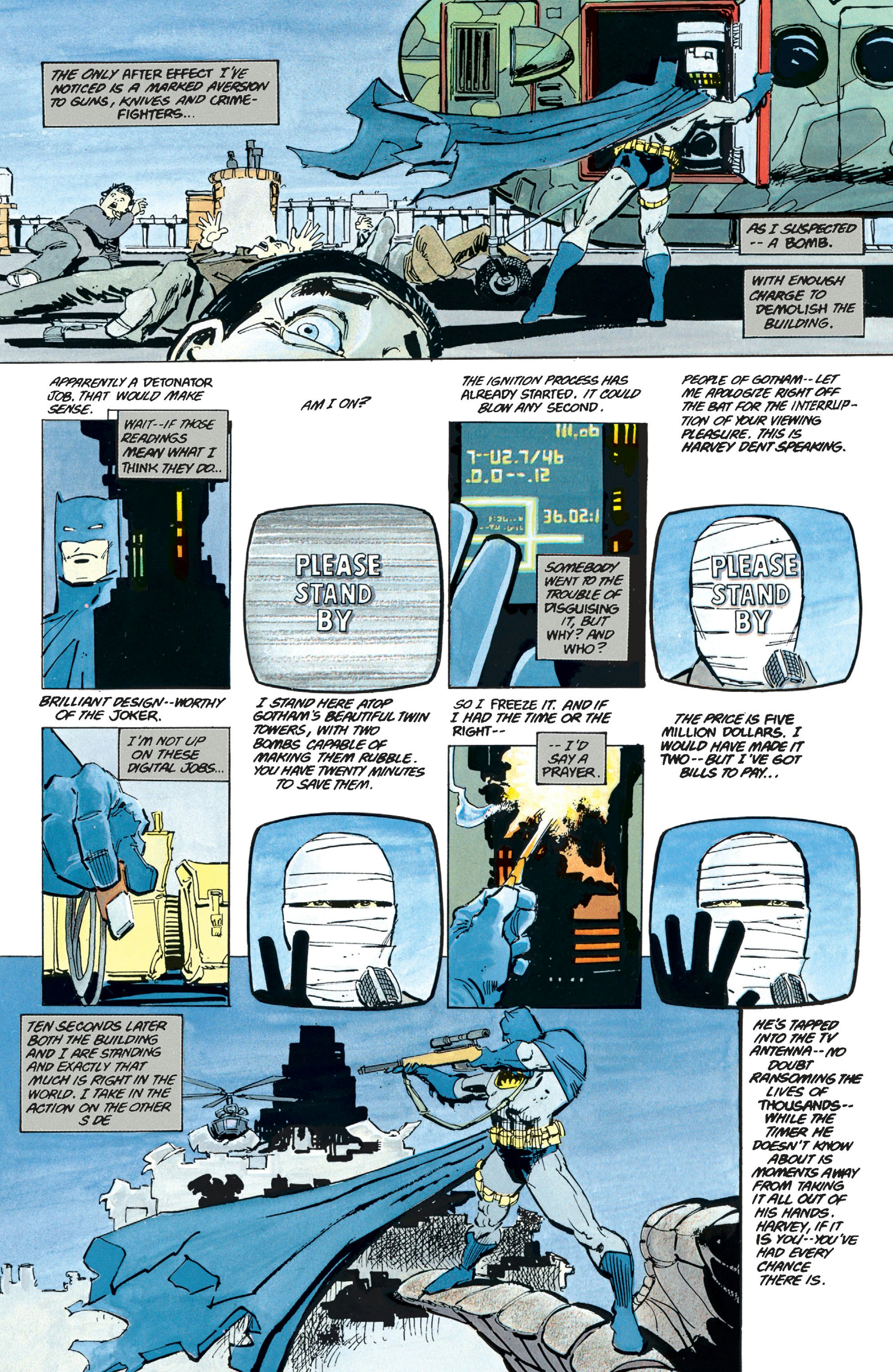
Zack Snyder: Now, I have this thing about 300. To me, 300 is a blend of historical events, and you used sort of this structure of the storyteller. What inspired you in that case? I know Herodotus is part of it, but the idea of using sort of a third party to get us into the story?
Frank Miller: I did that because I wanted to go Precambrian with it, to embrace the idea that our brains were different that long ago.
Zack Snyder: Oh, that's cool, OK.
Frank Miller: We thought much more as a collective than we now are, and so that's why I had the Spartans refer to themselves as we, and whenever we would normally use the word “I,” I would keep to the third person. If I wanted to hear the inner thoughts of King Leonidas, it would be focused outside him. It would be, “He thinks this,” not, “I think.” I wanted it to always feel like they were a hive. To me, that got across how this tiny group of people with fairly crude weapons could function like one organism. It was also really fun to draw the phalanx and the various reformations of it I came up with, it was like drawing pure intelligence in combat.

Zack Snyder: Nice, that's fun. And do you think that there is something to this notion that as Dilios tells us what's happening, do you think also there's a way kind of in the ancient mind where if I told you that I saw Xerxes and he looked like this? The line between myth and reality I think in the ancient world was much thinner. Xerxes could be a larger-than-life character, like larger than an actual human or the Immortals could be scarier than they would probably have been.
Frank Miller: Well, we kind of proved that, didn't we, Zack?! They just got more monstrous by the second.
Zack Snyder: But in my mind, that's kind of how I looked at it, like, “Oh, well, if Dilios is telling me and I've never seen this, then this is the way I would see it,” you know?
Frank Miller: I took liberties everywhere, like giving the Immortals Japanese samurai masks.
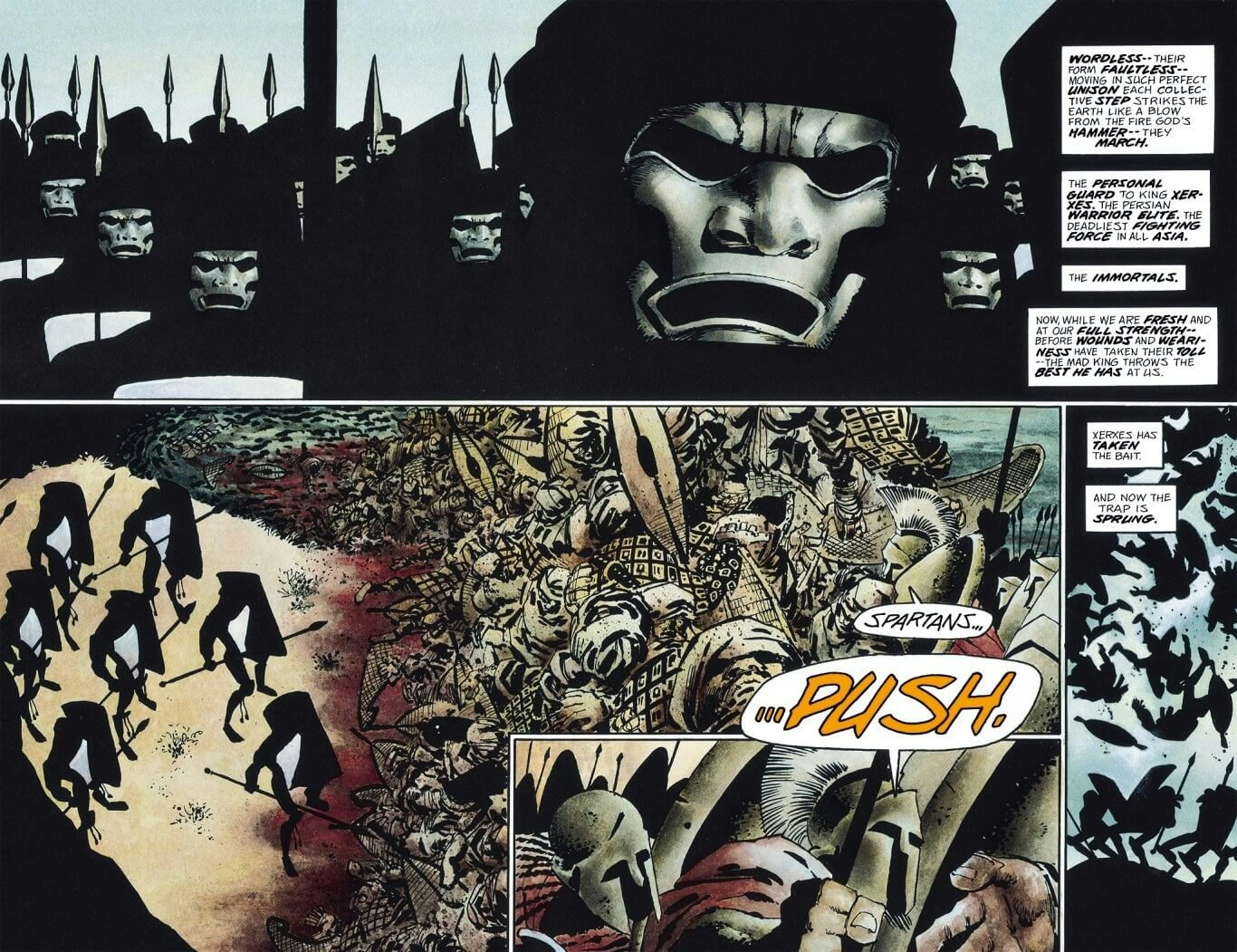
Zack Snyder: And I'm sure that in the version that was told around the Persian campfires, the Spartans would be monsters.
Frank Miller: Oh, yeah.
Zack Snyder: And they were.
Frank Miller: Oh, yeah. If you put it all through a modern lens, this stuff gets frightening and alien no matter which side you're looking at. I don't imagine either would be a group of people you'd really want to spend too much time with.
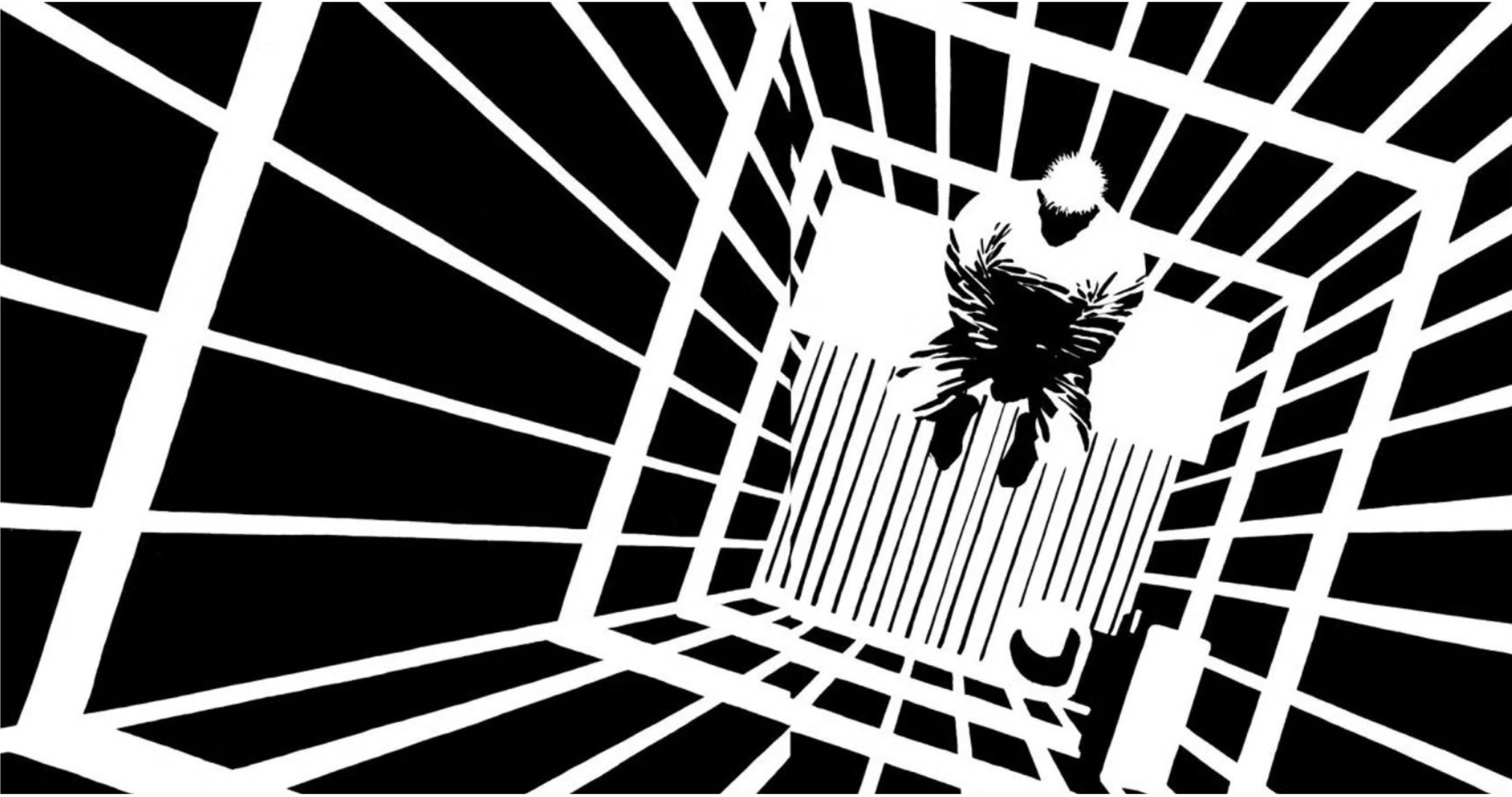
Zack Snyder: You use shadow and sort of stark contrast in your visual style. The way you do it is iconic. How do you view the relationship between your visual aesthetic and the more adult or mature themes in your stories? And that might get a little to your noir love.
Frank Miller: Well, that really has more to do with my development as an artist. I like to adapt by approaching the drawing, so it makes the best use of the subject, but the look of my work changed radically when I got to Sin City, and the desire was no longer to celebrate the careful outline or figures and to work within a delicately draw in the world and more to go for the gut-level emotion.
Zack Snyder: Do you think that when you were drawing Sin City, it kind of came along at the right time for you, because you had done all this sort of more representational, and then you got to Sin City and you were like, “I have the skill set to do anything, but now, in a weird way, this is the thing I want to look at.” You know what I mean? You know, like how you can make any image, but when you draw it for yourself, you're like, “Oh, that's cool. I'm going to draw more of this because I like this.”
Frank Miller: Yeah, I mean, I was drawing stuff that was kind of like a clumsy, early adolescent version of Sin City back when I was in high school. But when it came to actually doing Sin City, it was like starting my career all over again. I mean, I'd worked on the first movie I ever worked on and it had been a hell of an education, but it also made me want to concentrate more on comics that are using that form for all it's worth. And I set out to do Sin City thinking that this is one that could never be adapted. Little did I know about the wizardry that was out there.
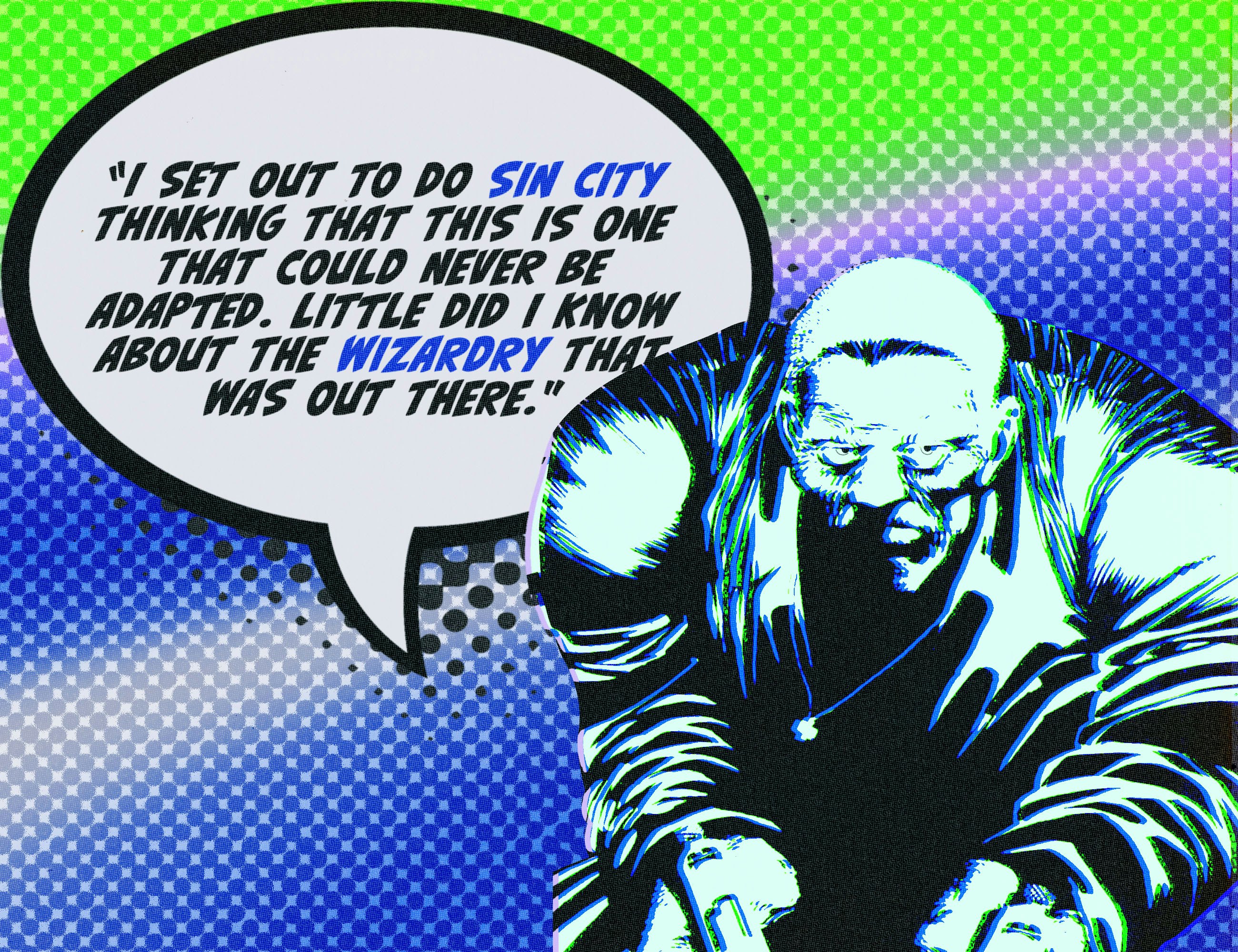
Zack Snyder: Yeah, it's beautiful. I mean, it's all you obviously, the different approaches, whether it be like Elektra Lives Again, or 300, which I kind of put them together in my mind, sort of artistically, and maybe Dark Knight is in that. And then as you go to something like Sin City where you do this. It's still your hand, obviously, but I guess the question is: Does it get reinvented for you in some ways? Are you re-inspired because now, “Oh, I get to draw in this way. That's fun,” you know?
Frank Miller: Yeah, it's, “Boy, I'll bet this is going to be hard.”
Zack Snyder: Oh, cool.
Frank Miller: And then there's those specific things that happen, facing the individual problems that are of the particular job. With Sin City, it's, “Oh my God, I can’t dodge these things anymore. I've got to learn how to draw guns and cars, and the women have got to start looking great. And oh my God, I've really got to learn how to draw the drapery. So, the trench coats billow instead of just hanging, and so on.” A new project is a wonderful opportunity. It's like going to grad school or something to take on a new project.
Zack Snyder: Oh, that's cool. The challenges maybe scare you, but inspire you at the same time?
Frank Miller: Absolutely, yeah.

Zack Snyder: That's like making a movie. Now with RoboCop, when you were sort of into that world, how did that fit into what you felt like your trajectory was going to be and where you were sort of artistically with your work in comics and illustrative work?
Frank Miller: I don't know, it was a brand new adventure, and I was just swept up in the excitement of it and trying to learn as much as I could. But it was definitely a major reset time in that I went from being kind of one of the big kids in a very small world to being a very small kid in a very big one. And the stakes were so high and the world of it was so dazzling. It was a major adjustment.
Zack Snyder: Did you draw anything for that movie?
Frank Miller: Well, I remember I drew a cover for the script, and I occasionally did little storyboards. But I didn't really do serious storyboards until Sin City came along.
Zack Snyder: Oh, that's interesting. Yeah, because if I was doing that, man, I would've had you drawing like crazy.
Frank Miller: Yeah, it's funny how that works. But as you know, so many of these decisions are made by the director. And as I recall, he had a storyboard artist of his own, who was much more obedient than I would've been.
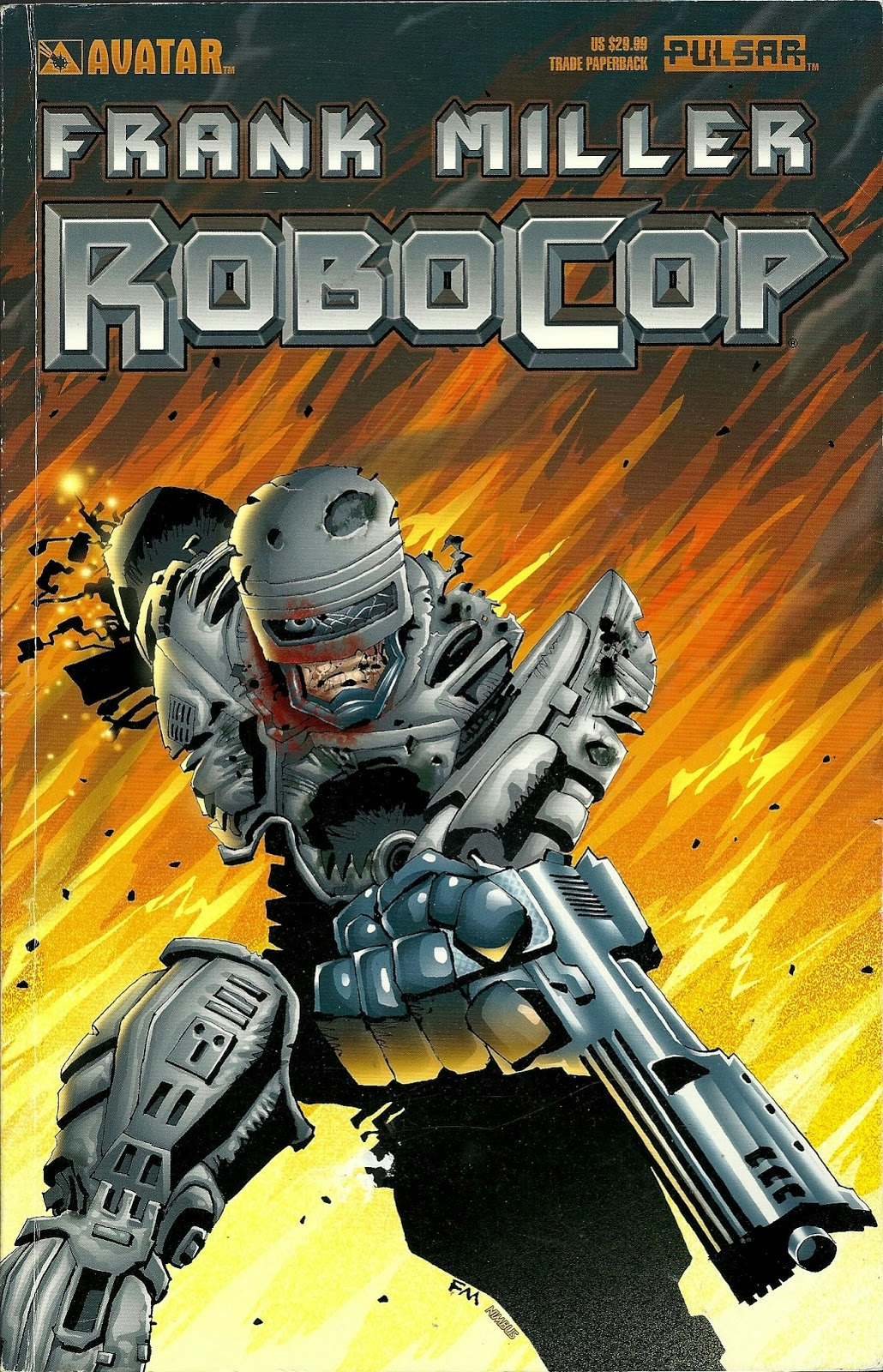
Zack Snyder: Which is probably true, but then you don't get the Frank Miller stuff though. You know what I'm saying?
Frank Miller: Whereas with Robert Rodriguez, he and I would be sitting side-by-side drawing.
Zack Snyder: Of course, it totally makes sense. Now, let's talk a little bit about the female characters: Elektra, or Nancy from Sin City. They're really layered and complex, and they often challenge hero gender concepts a little bit. And look, we know there are more male superheroes than female, but you seem to not shy away from writing a female character — and by the way, write great ones. So, do you make a conscious choice or is it that most inspiration where it's like this character just wouldn't leave you alone, so you had to write them?
Frank Miller: Well, it's mostly that. Character comes logically, but a lot of it's just the needs of the story. And I remember with Daredevil, it always struck me that the lead character would be this godlike figure in tights showing off his physique, whereas all the female characters would be almost all civilians, and they'd mostly be romantic. And so with Elektra, I wanted to combine the romantic side but mix it up with being an antagonist, a femme fatale, and constructing a long, tortured love story between the two.
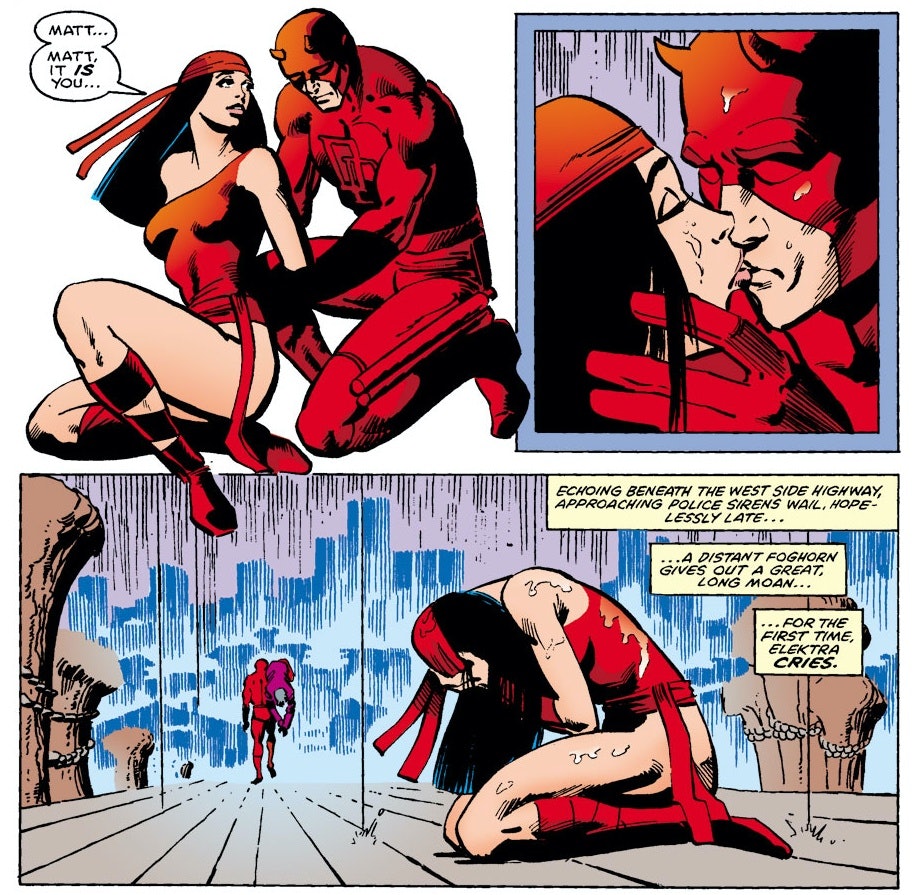
Zack Snyder: She challenges him kind of emotionally and physically, which I think is interesting.
Frank Miller: Yeah, she can take him in a fight.
Zack Snyder: Exactly, that's what I think makes her interesting.
Frank Miller: Basically, he doesn't want to hit a girl! But all of it did get back to the idea that they had this tortured passion. And, I mean, it was mutual. They would've wound up killing each other.
Zack Snyder: Awesome. All right, so listen, this will be the last question I got for you, because look, you've inspired me and countless other creators and artists in the comic book world and beyond, and you still are. It seems like you weren't conscious of changing the way comics are perceived, but you did. Do you feel like that is a cool thing to have left behind? Is that the legacy or is the idea that you've kind of changed comic books from a thing that now can be read as serious literature? And if you feel like that's what you did, is that cool or would you want more?
Frank Miller: I guess I would want my legacy to be one of creative ambition. To make a quest out of one’s career more than a job. To keep on keeping on. To challenge your colleagues, your audience, and yourself.
Zack Snyder: That's cool. It’s like, I'm a step in an evolution, which is a big deal.
Frank Miller: Yeah, it's kind of like, rather than thinking of oneself as being the climax of something, just think of yourself as being a Cro-Magnon. You're seeing brighter things in the future.
Zack Snyder: That's cool. Well, alright, Frank, thank you so much, brother. I really appreciate you taking the time to chat about this, and I will see you hopefully soon.
Inverse's 2024 Superhero Issue, guest edited by Zack Snyder, explores the genre for what it is: a profound commentary on our shared human experience. Dive into the full issue here.







